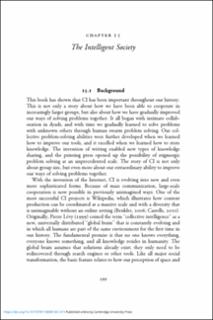| dc.contributor.author | Baltzersen, Rolf K. | |
| dc.date.accessioned | 2022-09-25T23:54:32Z | |
| dc.date.available | 2022-09-25T23:54:32Z | |
| dc.date.issued | 2022 | |
| dc.identifier.uri | https://hdl.handle.net/11250/3021121 | |
| dc.description | Chapter 15 in Cultural-historical perspectives on collective intelligence
In the era of digital communication, collective problem solving is increasingly important. Large groups can now resolve issues together in completely different ways, which has transformed the arts, sciences, business, education, technology, and medicine. Collective intelligence is something we share with animals and is different from machine learning and artificial intelligence. To design and utilize human collective intelligence, we must understand how its problem-solving mechanisms work. From democracy in ancient Athens, through the invention of the printing press, to COVID-19, this book analyzes how humans developed the ability to find solutions together. This wide-ranging, thought-provoking book is a game-changer for those working strategically with collective problem solving within organizations and using a variety of innovative methods. It sheds light on how humans work effectively alongside machines to confront challenges that are more urgent than what humanity has faced before. This title is also available as Open Access on Cambridge Core. | en_US |
| dc.description.abstract | Chapter 15 concludes by describe two radically different future visions of the intelligent society. On one hand, instrumentarian intelligence assumes that algorithms tracking human behavior can predict human behavior more accurately than ever before. In western countries, this intelligence manifests itself in a new surveillance capitalism with companies like Google and Facebook constantly searching for behavioral surplus in both online and offline settings. In the political domain, instrumentarian intelligence seeks a reputation state built on a neobehavioristic governing model. The most prominent example is the nationwide social credit system in China that makes it possible to grade citizens on different behavioral indicators. In stark contrast, civic intelligence highlights a use of technology still controlled by the community and citizens in contrast to the dehumanizing aspects of instrumentarian intelligence. While machine intelligence also craves for informational diversity in its hunt for behavioral surplus, civic intelligence seeks a broader diversity that includes not only information, but also multicultural, cognitive, biological, and participatory diversity. The “fuel” of CI is people who are different from each other, with different interests and unique perspectives. Civic intelligence also builds on a strong knowledge commons and an open shared collective memory. It does not hide information to produce the best predictions, but it promotes complete transparency and individual empowerment. In contrast to instrumentarian intelligence, CI still lets human-to-human intelligence, and not the algorithms, be at the core of the human collective problem solving. | en_US |
| dc.language.iso | eng | en_US |
| dc.publisher | Cambridge University Press | en_US |
| dc.rights | Attribution-NonCommercial-NoDerivatives 4.0 Internasjonal | * |
| dc.rights.uri | http://creativecommons.org/licenses/by-nc-nd/4.0/deed.no | * |
| dc.subject | Civic intelligence | en_US |
| dc.subject | Instrumentarian intelligence | en_US |
| dc.subject | Machine intelligence | en_US |
| dc.subject | Behaviorism | en_US |
| dc.subject | Mumford | en_US |
| dc.subject | Transparency | en_US |
| dc.subject | Surveillance capitalism | en_US |
| dc.subject | Reputation state | en_US |
| dc.subject | Diversity | en_US |
| dc.subject | Knowledge commons | en_US |
| dc.subject | Empowerment | en_US |
| dc.title | The Intelligent Society | en_US |
| dc.type | Chapter | en_US |
| dc.description.version | publishedVersion | en_US |
| dc.rights.holder | Rolf K. Baltzersen | en_US |
| dc.source.pagenumber | pp 399-418 | en_US |
| dc.identifier.doi | 10.1017/9781108981361.015 | |

